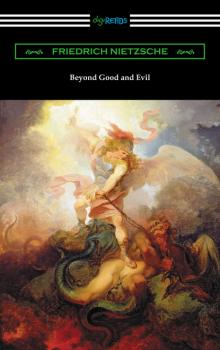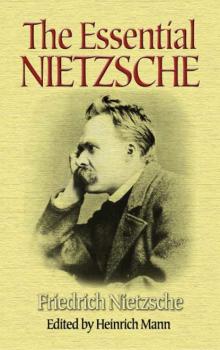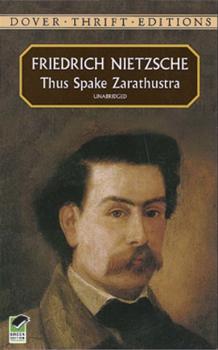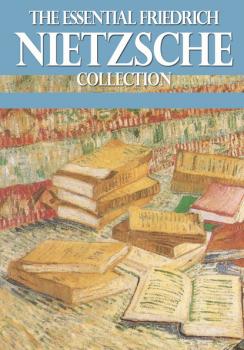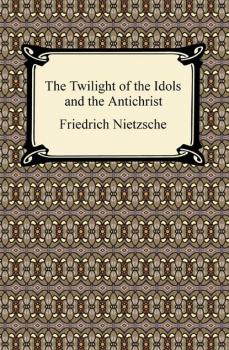Friedrich Nietzsche
Список книг автора Friedrich NietzscheBeyond Good and Evil (Translated by Helen Zimmern with Introductions by Willard Huntington Wright and Thomas Common)
German philosopher, Friedrich Nietzsche was one the most controversial figures of the 19th century. His evocative writings on religion, morality, culture, philosophy, and science were often polemic attacks against the established views of his time. First published in 1886, “Beyond Good and Evil” is a work that draws upon and expands the ideas that Nietzsche first addressed in his previous work, “Thus Spoke Zarathustra.” Nietzsche contrasts the concepts of good and evil as they were viewed in ancient times with the modern interpretations of them. As he asserts, the initial form of morality arises from the warrior nature of the ruling castes of ancient civilizations, who viewed themselves as good because of their wealth and power in contrast to the weakness of those that they enslaved. He further describes how the recasting of these ancient values through religion has given rise to a new “slave” morality, which defines goodness by a set of virtues which are contradictory to those of the ruling classes. Ultimately “Beyond Good and Evil” is a harsh criticism of philosophical systems that described a good person as the opposite of an evil one rather than just a relative expression of the impulses inherent in all men. This edition is translated by Helen Zimmern, includes introductions by Willard Huntington Wright and Thomas Common, and a biographical afterword.
The Gay Science
Although dour in appearance and formidable in reputation, Friedrich Nietzsche was an ardent practitioner of the art of poetry—called in twelfth-century Provencal «the gay science.» This volume, which Nietzsche referred to as «the most personal of all my books,» features the largest collection of his poetry that he ever chose to publish. It also offers an extensive and sophisticated treatment of the philosophical themes and views most central to his thinking, as well as the ideas that proved most influential to later philosophers.Dating from the era when Nietzsche was at the peak of his intellectual powers, most of this book was written just before Thus Spoke Zarathustra, and the rest of it five years later, after Beyond Good and Evil. Zarathustra makes his first appearance in these pages, along with the author's well-known proclamation of the death of God—a concept to which much of the book is devoted—and his doctrine of the eternal recurrence. Readers will find this volume a wellspring for some of Nietzsche's most sustained and thought-provoking discussions of art and morality, knowledge and truth, the intellectual conscience, and the origin of logic.
The Essential Nietzsche
A prominent intellectual of the Weimar era, Heinrich Mann was a leading authority on Nietzsche. This volume consists of Mann's selections of highlights from the philosopher's works, along with an introduction that explains their significance to modern readers.Key excerpts from Nietzsche's books include passages from The Birth of Tragedy, Thoughts Out of Season, The Dawn of the Day, The Joyful Wisdom, Thus Spake Zarathustra, Beyond Good and Evil, The Genealogy of Morals, The Case of Wagner, Nietzsche Contra Wagner, The Twilight of the Idols, The Antichrist, Ecce Homo, and The Will to Power. For ease of reference, Mann has arranged the text in sections corresponding to Nietzsche's views on science, philosophy, and truth; his critiques of culture — the use and abuse of history, Europeans and Germans, Wagner, the genealogy of morals, and nihilism; his concept of the world without God, including the birth of tragedy out of the spirit of music, the true and the apparent world, and eternal recurrence; and his confessions.
Thus Spake Zarathustra
A tremendously influential philosophical work of the late nineteenth century, <I>Thus Spake Zarathustra</I> is also a literary masterpiece by one of the most important thinkers of modern times. In it, the ancient Persian religious leader Zarathustra (or Zoroaster) serves as the voice for Friedrich Nietzsche's views, which include the introduction of the controversial doctrine of the <I>Übermensch,</I> or «superman.» <BR>Although later perverted by Nazi propagandists, the <I>Übermensch</I> was conceived by Nietzsche to designate the ultimate goal of human existence as the achievement of greatness of will and being. He was convinced that the individual, instead of resigning himself to the weakness of being human and worshipping perfection only possible in the next world (at least in the Christian view), should try to perfect himself during his earthly existence, and transcend the limitations of conventional morality. By doing so, the <I>Übermensch</I> would emerge victorious, standing in stark contrast to «the last man» — an uncreative conformist and complacent hedonist who embodies Nietzsche's critique of modern civilization, morality, and the Christian religion. <BR>Written in a passionate, quasi-biblical style, <I>Thus Spake Zarathustra</I> is daring in form and filled with provocative, thought-provoking concepts. Today, the work is regarded as a forerunner of modern existentialist thought, a book that has provoked and stimulated students of philosophy and literature for more than 100 years. <BR>
Human, All-Too-Human
"Offers dazzling observations of human psychology, social interaction, esthetics and religion."—New York Times Book ReviewWith Human, All-Too-Human, Nietzsche challenges the metaphysical and psychological assumptions behind his previous works. The philosopher reviews his usual subjects—morality, religion, government, society—with his characteristic depth of perception, unflinching honesty, and iconoclastic wit. His manner of expression, however, takes a new turn.More than 1,400 incisive and poetic aphorisms appear here. Subtitled «A Book for Free Spirits,» this volume marks the author's first use of the aphoristic approach, which he retained in his subsequent writings and elevated to new heights. The style is particularly suited to this book, which rejects overly systematic thinking and conventional wisdom, anticipating both existentialism and post-modernism. Many themes of Nietzsche's later works first appeared here, making Human, All-Too-Human fundamental to an understanding of the author's thought.
The Genealogy of Morals
Written in response to a book on the origins of morality by his erstwhile friend Paul Rée, the three essays comprising The Genealogy of Morals — all three advancing the critique of Christian morality set forth in Beyond Good and Evil — are among Nietzsche's most sustained and cohesive work.In the first essay — starting from a linguistic analysis of words such as «good,» «bad,» and «evil» — Nietzsche sets up a contrast between what he calls «master» morality and «slave» morality and shows how strength and action have often been replaced by passivity and nihilism. The next essay, looking into the origins of guilt and punishment, shows how the concept of justice was born — and how internalization of this concept led to the development of what people called «the soul.» In the third essay, Nietzsche dissects the meaning of ascetic ideals.It is not Nietzsche's intention to reject ascetic ideals, «slave» morality, or internalized values out of hand; his main concern is to show that culture and morality, rather than being eternal verities, are human-made. Whether or not you agree with all of his conclusions, his writing is of such clarity and brilliance that you will find reading The Genealogy of Morals nothing short of exhilarating.
Beyond Good and Evil
After kicking open the doors to twentieth-century philosophy in Thus Spake Zarathustra, Friedrich Nietzsche refined his ideal of the superman with the 1886 publication of Beyond Good and Evil. Conventional morality is a sign of slavery, Nietzsche maintains, and the superman goes beyond good and evil in action, thought, and creation. Nietzsche especially targets what he calls a «slave morality» that fosters herdlike quiescence and stigmatizes the «highest human types.»In this pathbreaking work, Nietzsche's philosophical and literary powers are at their height: with devastating irony and flashing wit he gleefully dynamites centuries of accumulated conventional wisdom in metaphysics, morals, and psychology, clearing a path for such twentieth-century innovators as Thomas Mann, André Gide, Sigmund Freud, George Bernard Shaw, André Malraux, and Jean-Paul Sartre, all of whom openly acknowledged their debt to him.Students of philosophy and literature as well as general readers will prize this rich sampling of Nietzsche's thought in an unabridged and inexpensive edition of one of the philosopher's most important works.
The Birth of Tragedy
Among the most influential philosophers of modern times, Friedrich Nietzsche (1844-1900) declared in this classic study that Greek tragedy achieved greatness through a fusion of elements of Apollonian restraint and control with Dionysian components of passion and the irrational. In Nietzsche's eyes, however, Greek tragedy had been destroyed by the rationalism and optimism of thinkers like Socrates. Nevertheless, he found in these ancient works the life-affirming concept that existence is still beautiful, however grim and depressing it may sometimes be. These and many other ideas are argued with passionate conviction in this challenging book, called by British classicist F. M. Cornford «a work of profound imaginative insight, which left the scholarship of a generation toiling in the rear.»
The Essential Friedrich Nietzsche Collection
Compiled in one book, the essential collection of books by Friedrich Nietzsche:<br><br>Table Of Contents<br><br>THE ANTICHRIST <br><br>BEYOND GOOD AND EVIL <br><br>*I: The Case Of Wagner* <br><br>HOMER AND CLASSICAL PHILOLOGY. <br><br>ON THE FUTURE OF OUR <br><br>Thoughts Out Of Season – Part One <br><br>THUS SPAKE ZARATHUSTRA
The Twilight of the Idols and The Antichrist
Perhaps one of the most controversial and inflammatory philosophers in western civilization, Friedrich Nietzsche summarized his extraordinary ideas in «The Twilight of the Idols.» This work is a lightning strike on many of the prevalent ideas of his day, especially what he describes as the 'The Problem of Socrates' and 'The Four Great Errors.' Overall, Nietzsche attacks our system of evaluating life, the confusion of cause and effect, self-deception, accountability and free will, and the concepts of vice and morality. The alternative title of this work is, appropriately, «How One Philosophizes with a Hammer.» This work, written in just over a week, prepares readers for the ideas found in «The Anti-Christ.» Also written in 1888, it expands on Nietzsche's blatant disagreements with institutional Christianity. Though written to deliberately rouse anyone who reads them, these works are perhaps most shocking not in their frank negativity concerning nearly all aspects of humanity, but in the profound depth of their understanding of human nature and the actual optimism subtly affirming man's capabilities and possibilities.
